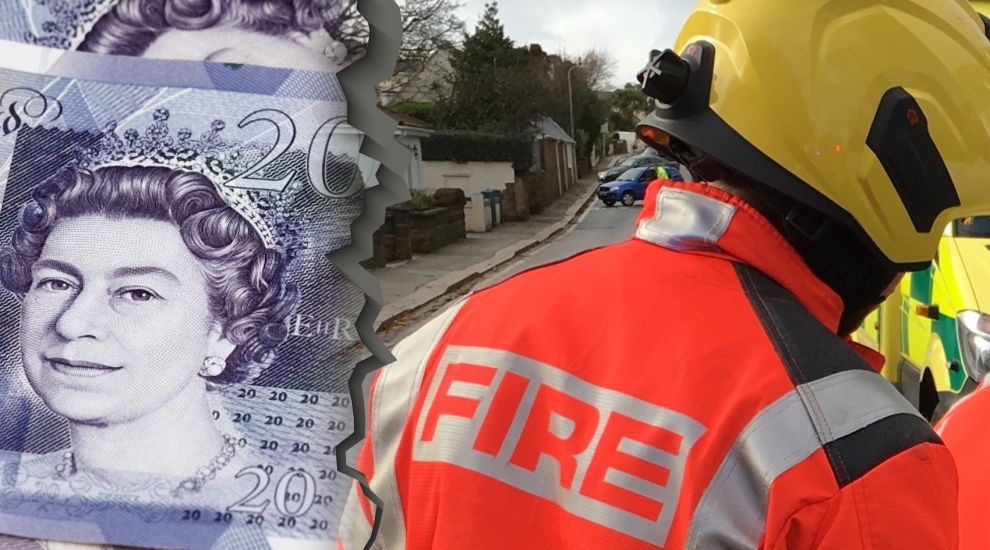


The loss of crew members and the reduction of managers and ranks has left the Fire Service spread too thinly to cope with the ever-increasing number of incidents, the firefighters' union has warned.
The comments from the States of Jersey Fire & Rescue Service Association (JFRSA) come in reaction to a £1.25m proposal to reorganise the Justice and Home Affairs (JHA) department between 2021 and 2024 announced in the latest Government Plan.
The changes, which link to the larger 'OneGov' reorganisation of public services, would affect the way in which the Fire Service operates by pulling it under the JHA umbrella - something the JFRSA says would be detrimental to their work.
Invited to comment on the Government Plan as part of the review conduced by the Corporate Services Scrutiny Panel, JFRSA Tim Le Cocq emphasised Chief Fire Officers' need for operational independence.
Pictured: The Government Plan pledges £1.25million to be invested into the reorganisation of the Justice and Home Affairs (JHA) department between 2011 and 2024.
His comments echoed the findings of a report by Her Majesty’s Chief Inspector of Fire and Rescue Services, which advocated: “Chief fire officers should have operational independence to run their services effectively and efficiently to meet the priorities and commitments in their integrated risk management plans.”
While the Government Plan promises to “appropriately resource” the JHA department, Mr Le Cocq noted that the Fire and Rescue Service has seen its staff numbers reducing continually over the last few years. As those reductions have been done “with no evidential risk assessment to justify the losses”, he urged more research to be done for the service to have the resources it needs.
He also issued a reminder that the level of activity the Fire Service is dealing with in the island is similar to that seen in England, where crews have access to specialist teams and cross-county support arrangements for large or multiple incidents.
“As such, the ability for the Service to safely and effectively resource incidents, particularly with the findings of the Grenfell Tower Inquiry in mind, should be considered by appropriate local risk assessment rather than resourcing simply to budget alone,” Mr Le Cocq wrote.

Pictured: Capacity for prevention was scrapped before being reintroduced without new resources.
In addition to his comments, Mr Le Cocq sent the JFRSA’s comments on the second phase of the 'Target Operating Model' - a blueprint for the Government's new management structure - to the Scrutiny Panel, which raised concerns about the impact of cost-savings on the quality of service and the safety of firefighters.
The Association highlighted that staff numbers have reduced while the number of emergencies has increased in six out the last 10 years.
They noted that the Prevention department, which had been cut due to austerity measures since 2008 and the Medium Term Financial Plan (MTFP), had been reintroduced in the new model, with the workload being place “on an already reduced number of staff
With the number of dwelling fires constantly rising since 2008, the JFRSA said the service is being spread ”too thinly”, posing a risk to the public and firefighters alike.
“The business case underestimates the number of incidents attended by SJFRS at 700 per year, when for the past decade has been approximately 1,100 per year,” they said.

Pictured: Both the Ambulance Service and the Fire Service need "additional support and investment".
Like the Ambulance Service, the JFRSA says the Fire Service needs “additional support and investment in personnel over and above collaborative working.”
“The balance between core duties and collaboration is a fine line with already reduced staff numbers and the need to improve collaboration at frontline level is unlikely to produce great monetary savings other than avoidance of recruiting more staff,” they noted.
The Association also said the reduction in the number of managers and in ranks has led some roles to be burdened with more responsibilities.
In addition, shift patterns for the Duty Manager (Station Commander) role are said to “make for poor wellbeing” and resilience as staff are having to work for 10 days straight.
“It would appear that Station Commanders are being used to make up for a missing senior management team – depleted over time due to MTFP2, managed vacancies and non-replacement of senior retirees,” the JFRSA wrote.
Issues were also raised with job descriptions for the roles, which are said to lack consistency between ranks, sometimes being too brief and on other occasions too broad, thus leading to “potentially large consequences with unknown reward” for employees.
The Government Plan 2021-2024 is currently set to be debated on 14 December 2020.
Comments
Comments on this story express the views of the commentator only, not Bailiwick Publishing. We are unable to guarantee the accuracy of any of those comments.